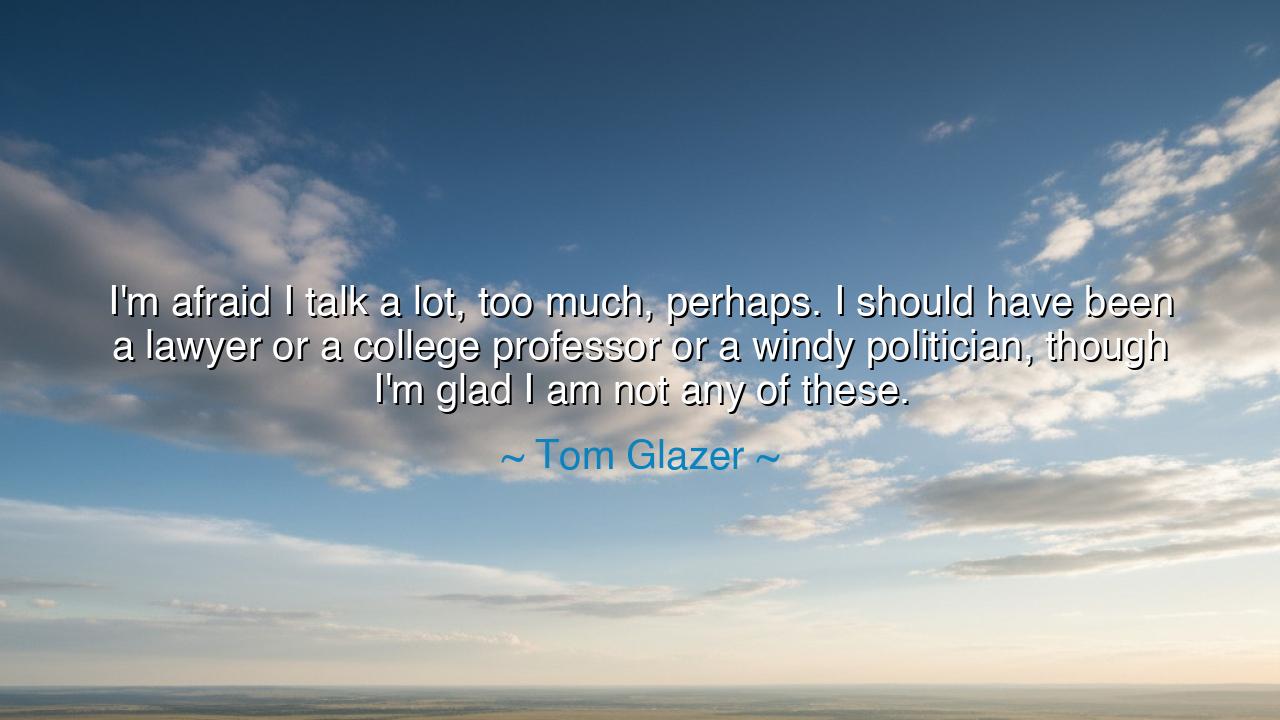
I'm afraid I talk a lot, too much, perhaps. I should have been a
I'm afraid I talk a lot, too much, perhaps. I should have been a lawyer or a college professor or a windy politician, though I'm glad I am not any of these.






Hear, O seekers of song and wisdom, the voice of Tom Glazer, who once confessed with humility and humor: “I’m afraid I talk a lot, too much, perhaps. I should have been a lawyer or a college professor or a windy politician, though I’m glad I am not any of these.” In these words we hear both jest and revelation. They are not only the musings of a man known for his music, but the recognition that the gift of words—though powerful—must find its proper vessel. For words can persuade, enlighten, and inspire, but they can also overwhelm, deceive, and weary if not guided by wisdom.
The meaning of Glazer’s reflection is twofold. First, he acknowledges the abundance of his speech, a torrent that might have found its place in professions of endless discourse: the lawyer, who argues ceaselessly; the professor, who lectures long into the day; the politician, who spins promises into the wind. Yet second, he recognizes that his path—songwriter and folk musician—was a truer calling, for in music his words found rhythm, purpose, and beauty. Thus he is glad to have avoided those other roles, for though he spoke much, he spoke in harmony with melody, reaching hearts rather than courtrooms or chambers.
The ancients knew that speech is both gift and danger. The Greek Sophists were masters of talk, able to sway multitudes with dazzling rhetoric, yet often accused of valuing persuasion above truth. Socrates, by contrast, sought dialogue not for glory but for wisdom, questioning until the heart of truth was revealed. In Glazer’s words, we hear this ancient tension: to talk much is natural, but to talk well is rare. The worth of speech lies not in its volume but in its intent and its fruits.
Consider the story of Demosthenes, the great orator of Athens. As a youth, he was mocked for his weak voice and poor delivery. Yet through practice—placing pebbles in his mouth, reciting over the roar of the sea—he transformed himself into a speaker who could stir the city to action. His example shows that even abundant speech, if disciplined, can become the tool of greatness. Glazer, too, had an abundance, yet found discipline through music, shaping words into verses that would be remembered by generations of children and lovers of folk song.
But let us not think his jest is mere self-deprecation. There is wisdom in his gladness at not becoming a lawyer, professor, or politician. For these roles, though noble when practiced with integrity, often bind one to institutions where words may lose their soul—arguments for clients regardless of justice, lectures for pay rather than enlightenment, speeches for power instead of truth. Glazer, by contrast, allowed his words to serve art and community, unshackled by such demands. His gladness is a reminder that each person must find the vessel that suits their gift.
The lesson for us, then, is this: embrace your talents, even when they seem excessive, but channel them toward a path that brings joy, beauty, and service. Do not despise your nature—whether it is to speak much, to dream much, or to work endlessly—but refine it, guide it, and place it in harmony with your purpose. What seems weakness in one role may be strength in another. The talkative soul, miscast as a bore, may in truth be a poet, a teacher of hearts, or a singer of truths.
Therefore, O listener, ask yourself: how will you use the abundance within you? If you have the gift of words, let them heal and inspire, not merely fill the air. If you have the gift of thought, let it guide and build, not merely dazzle. If you have the gift of song, let it lift spirits, not feed vanity. In this lies the wisdom of Glazer’s reflection: to know yourself, to laugh at your excesses, and to choose the path where your gifts are most alive.
And so remember his words, spoken with humility and cheer: “I talk a lot, too much, perhaps.” Yet by finding the right vessel, he turned excess into art, chatter into melody, and words into legacy. May you, too, find the vessel for your gifts, and in doing so, discover not only gladness but greatness.






AAdministratorAdministrator
Welcome, honored guests. Please leave a comment, we will respond soon